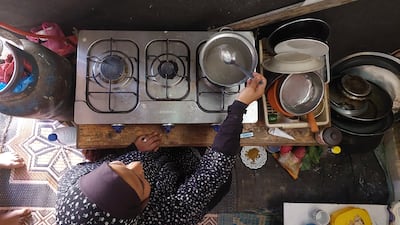In the heart of Gaza, where the war's shadows stretch long and deep, mothers are fighting a quiet, resilient battle. Scarce food, no access to fresh vegetables or meat, and a continuing siege on aid, has turned their desperation into resilience; cooking traditional Palestinian dishes with what little ingredients they can find. They may not taste the same, but they carry an unwavering determination to survive.
For Um Yazen Al Attla, 29, the daily struggle is not just about finding food but also about preserving a semblance of normality for her three children. Displaced seven months ago from Rafah to Al Mawasi in Khan Younis, her new life is filled with challenges, yet she relentlessly finds ways to provide them with what they want.
“My children keep asking for ejjeh,” she told The National, referring to a traditional dish made with eggs and vegetables. “I don’t have most of the ingredients, and even if I try to make it, it costs more than I can afford.”
Her five-year-old son recently broke down in tears, craving the dish his mother used to make with cauliflower – now an unaffordable item. Determined to soothe him, Ms Al Attla improvised: she used eggs, parsley, oil, and canned peas instead of cauliflower, and the moment her son tasted it, he was back to smiling again.
“It wasn’t the same taste,” she admits, “But they were just happy to have something different from the usual soup, rice, and canned food.” A small victory amid the chaos of this war.
The dish costs about 60 shekels ($16) to make – four times more than it did before the war. “We’ve been robbed of normal life,” she said, “but I’ll keep trying to give my children what little joy I can.”
Food insecurity is a major concern for Gazan, suffering from a 14-month old gruelling war on their tiny enclave and minuscule amounts of aid entering among a siege. The UN Relief and Works Agency UNRWA issued warnings last week over an imminent famine, with vegetables almost fully disappearing and people surviving on lentil, bread and canned food. About 19,000 children were taken to hospital due to acute malnourishment, the agency said.
Traditional dishes with a twist
The challenge of making traditional dishes is even bigger for Israa Homaid, 35. Her son, four, often craves shawarma, she says; a dish traditionally made with meat and eggs, both of which have completely vanished from his diet due to their high cost. However, she is finding ways around it, creating vegetarian alternatives to mimic the original dish. “My son asked for shawarma,” Ms Homaid said. “So, I made it out of flour.”
The process, she explains, involves mixing flour with cold water and washing it until it’s free of starch. Then she adds Maggi (cubes with meat flavour) and shawarma spices, blends and boils it. Once the dough is ready, she cooks it as she would real shawarma.
“When my son ate it, he was so happy,” Ms Homaid says with a smile. “He’s still too young to distinguish the taste. I’m forced to do this, our children shouldn’t bear the guilt of living in this situation.”

The war, she says, isn’t just a battle for survival but a fight to protect her child’s innocence. “It’s been a year of war,” she says. “Do you know what that means? A whole year without proper protein for our children’s bodies. But what choice do we have?”
“We do this to bring happiness to our children,” says Ms Homaid. “Because if we can’t protect their futures, at least we can ease their present pain.”
Gaza’s mothers are doing more than feeding their children, they are creating hope from despair.
Gazan mother
Hannan Timraz, whose family was displaced from Rafah to Khan Younis, worries that one day she will not be able to meet her children's needs. “I worry if my children ask for something and I can’t give it to them … What if it’s their last request?”
Her four-year-old girl's craving for avocado also led to her creativity. A single avocado at the market is priced at an extortionate 20 shekels ($5), far beyond her reach. Instead, she bought canned peas for 5 shekels and a clove of garlic for 4 shekels, blending them into a paste.
“At first, my daughter realised it wasn’t avocado,” Ms Timraz told The National. “But I sat beside her, eating it myself and telling her how delicious it was. Eventually, she believed me and ate it too.”
Her voice cracks as she shares her deepest fears. “Our life is neither safe nor calm. We live knowing that if we survive this moment, the next could be our last.”



